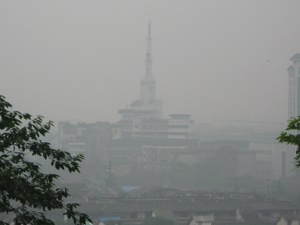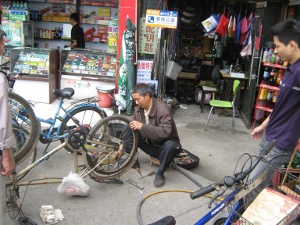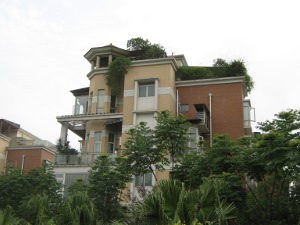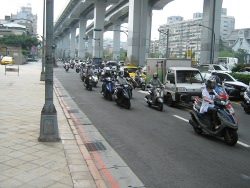Think of this as Volume 12, Number 22 of A-Clue.com, the online newsletter I've written since 1997. Enjoy.

Today's China reminds me a lot of that show.
My son and I just completed a week in Chengdu. It is a nice city, situated in a bowl on a plain that was also the home of one of the first Chinese Kingdoms .
But in most ways it is brand new.
Like the rest of China much of its modern history dates from 1979, when the country began opening up economically. The differences between then and now are stark. The old city is nearly destroyed – there are just litle bits here and there – and a city much like New York has taken its place along wide avenues placed by Chairman Mao. (A huge statue of him directs traffic in the center of town.)
“Mad Men” is a show in which everyone lies to themselves about their inner reality. Everything about the 1960s is just below the surface, waiting to explode. Chengdu is much the same. All the various revolutions of the 1960s are waiting to appear, they are just below the surface, yet the citizens are completely wrapped up in their external prosperity.
Let me offer some examples:
The Green Revolution – Staying a week in Chengdu is like smoking. I felt the same sensations – difficulty sleeping, high energy, relaxation – I felt on a 1997 cruise filled with smokers. It's not just that many Chinese men smoke, and do so openly, even in elevators. It's also the pollution, the LA-like haze which fills the plain and gives off a smell of burning metal. This can't continue. The streets are already so filled with cars that it's difficult to get around.
- The Youth Revolution – This is an unintended consequence of the “one-child policy” I saw play out continually. Chinese kids today are just like spoiled American kids of my era. They're like looking into a mirror of my past. They get away with murder, and they're constantly indulged. On my last day there I saw two teenagers wearing the scariest t-shirts imaginable, reading only “Why Not?” When these little emperors and empresses, highly educated, necessary to China's continuing success, start asking that question, watch out.
- The Womens Movement – It's true that most women work. Our hostess works, and does a great job of it. Yet in many ways old stereotypical sexual ways are reasserting themselves. Men are making decisions and gaining total control over families. Even stupid men. As women gain economic power in the workplace it is hard to see them continuing to abide this state of affairs.
The War of Class against Class
The economic reforms have brought classes back to China. There aren't just three. There are several, defined by how they get around:
-
Walkers – Peasants in the countryside, and a growing number of urban beggars, have no transportation at all. They are invisible today, thanks to prosperity, but should prosperity be threatened they will become very obvious.
-
Bikers – Bikes are ubiquitous in Chengdu. We rode some one day. They're like kids' bikes from the 1960s. Most have one speed, upright handlebars, panier frames in the back and baskets (some lockable) in the front. This is how most in the lower middle class get around. I distinguish them from the peasants, because having a bike of your own really is a serious step up. Chengdu is filled with bicycle rickshaws – bicycle owners put two-seat cabs behind their bike frames and hire themselves out. Other working bicycles carry recycling or piles of boxed goods, bound with bungee cord.
-
Electric Bikes – The next step up from a bike is one with a tiny electric motor. You still have the pedals, but now you can get to an office job without sweating so much. Many secretaries and other low-ranking office workers ride electric bikes.
-
Electric Scooters – These are distinguished from electric bikes by having a larger motor and no pedals. These people make more than those on the electric bikes. They go faster, they weave in-and-out of bike traffic. But they still get the same great deal when they park. Every bike rack has someone to watch over it, who collects 3 Mao (three-tenths of a Yuan, or 2 cents) from each customer. These people themselves are generally of the bike class.
-
Motorcycles – Most motorcyclists in mainland China have yet to discover helmets. These are the kings of the bike lanes. Motorcycles have gas engines and can even weave in-and-out among cars. They can use more of the road than any other vehicle. Many young people entering into upper middle class careers ride motorcycles while they save for a home of their own.
-
Cars – My hosts in Chengdu were car-mad, and so are many urban Chinese. A car is the ultimate status symbol. You can shop in bulk with a car, you can enjoy air conditioning with a car. A car means you have made it, that you have serious status. Most cars I saw were from BMW, Mercedes, Audi or Buick. Big cars that make a serious thunk when you close their doors, much more expensive than the car I drive in Atlanta. One of the best features on my host's car was a radar system that sounded as he backed up. The speed of the sound accelerated as he approached a curb or another obstacle he could not see. Sweet.
You would think people with cars would naturally have apartments. Not so. As our host explained most middle income people make 1500-2500 yuan per month ($2-350), which spends good on food (the middle class eats like Americans, with duck replacing some of the chicken and fatty pork some of the beef) and computers, but can't stretch to fit a mortgage. Apartments, which are rising everywhere in Chengdu, cost $10/square meter to build. They start at 34 sq meters – about the space of an American living room. The one we stayed in must have been over 100 sq. meters, nearly 1,000 square feet, with a kitchen, separate dining bedrooms, two bedrooms, a study that can be a third bedroom and even a back deck with a washing machine. That's got to cost $150,000, or over 1 million yuan. Even Countrywide Mortgage, on its best days, couldn't do that math for people.
It is possible that things might work out. I don't see China getting into a land war on any foreign continent. But there is an obvious generation gap building. China needs a War Against Oil as much so it can breath as so it can prosper. There are all kinds of social revolutions hiding just below the surface but no one with influence, neither public officials nor ordinary members of the middle class, seems willing to see the reality.
One other thing. We keep worrying that China is about to overtake us economically. Forget it. China is a young country today but thanks to the one-child policy it is aging rapidly. It's going to be Japan in 20 years, maybe less. Think of that giant pile of foreign exchange as being their Social Security trust fund.
I want to say also that China is a wonderful country, filled with wonderful people as well as unsurpassed history and natural beauty. Many Americans view the early 1960s as a golden age, one reason for the popularity of the TV show. While much suffering followed, today's America is better for it. It's good we can be honest about ourselves, about how we love and live. The political revolutions of that era brought gains that are still with us, gains I believe will keep us ahead of China throughout my life and that of my children.














what are natural colon cleanser
Dana Blankenhorn: Mad Men